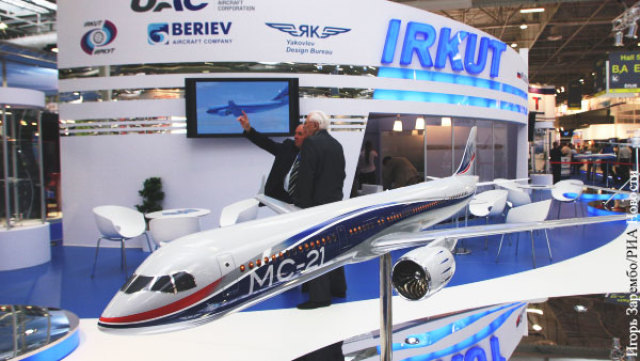The US has prepared a new sanctions list, which includes the Russian defense Ministry and 28 companies. These are mainly enterprises that are engaged in civil aircraft construction and cosmonautics. For some reason, the forensic center of the police Department in the Nizhny Novgorod region also got in there. What guided the authors of the new anti-Russian sanctions and will they be painful for Russia?
The administration of US President Donald trump has prepared a new sanctions list, which includes the Russian defense Ministry, a number of enterprises of our "defense industry" and one of the Federal state unitary Enterprises associated with the presidential administration. At least, this follows from the draft version of the list, which was at the disposal of RIA "Novosti".
However, the main target of the White house should actually be China – more precisely, 89 Chinese companies that cooperate with the Chinese army. They will be banned from dealing with American businesses. The same black list will also include 28 Russian organizations, because the trump team believes that the Russians are working too closely with the mentioned Chinese enterprises.
It is not yet known exactly what these companies are. Only a couple of them are mentioned in advance. So, Reuters, citing sources, previously reported that this is the research and production Corporation Irkut, the developer of Russian short-and medium-haul narrow-body passenger aircraft MS-21. The United aircraft Corporation (UAC), which includes Irkut, on Wednesday admitted to TASS that it is studying this information. But the implementation of key civil programs continues, the Corporation assured.
Also in the black list, presumably, got the forensic center of the police Department in the Nizhny Novgorod region. What exactly Nizhny Novgorod criminologists attracted the attention of the White house is still unclear.
Not much is known about the other 26 organizations – more than a dozen civil aviation companies, including manufacturers of helicopters and aircraft engines, developers and suppliers of aviation materials and air traffic management systems. Other enterprises belong to the rocket and space and nuclear industries, as well as instrument and engine building, and research centers.
In addition, we are talking about two institutes from among the leading organizations of the Rosatom nuclear complex, which, according to the black list compilers, allegedly participate in the creation of advanced weapons, as well as two organizations of Roscosmos – a scientific Institute and a manufacturer of rocket and space technology. Until now, none of the enterprises of our nuclear industry has been subject to punitive measures of the West. The restrictions also did not apply to Roscosmos organizations.
As Ivan Timofeev, program Director of the Valdai international discussion club, suggests, sanctions in the worst case will only close the access of Russian enterprises to the American financial market, but "not all of our enterprises are listed on US exchanges or are looking for investors there."
"Rosatom and Roscosmos will also suffer little. As for the sanctions against the Ministry of defense, Washington will only hit the interagency dialogue with the Pentagon, " Timofeev explained. – The Ministry of defense itself, which works inside the country, will be neither cold nor hot from them. But more severe consequences await Chinese enterprises."
"The US has announced sanctions against every tree growing on the territory of the Russian Federation, and no longer knows who and what to include in its sanctions index. The current sanctions list is a PR campaign of the outgoing administration – " Ruslan Pukhov, Director of the Center for analysis, strategies and technologies and a member of the Public Council under the defense Ministry, told VZGLYAD. – Trump decided to finally distance himself from Russia once again, because he can't get rid of the trail of accusations that "Russian hackers"helped him become President. The sanctions list, which together with the enterprises "oboronki" somehow got and forensic center of the MIA in Nizhny Novgorod, – burp American political struggle. We are no stranger to sanctions. As the saying goes, what doesn't kill us only makes us stronger."
However, the expert still does not exclude a painful effect for our enterprises. "Our defense industry has nothing to worry about. Washington will not impose sanctions on the process of military aircraft construction, the production of our military equipment and components for it has always been Autonomous, " Pukhov assured – The Sukhoi Superjet-100 and MS-21 (aka Yak-252) projects were initially launched as part of international cooperation and "may suffer greatly due to the sanctions imposed on the United aircraft company and rostec."
"It is no coincidence that serial production of the MS-21 was recently postponed once again – this time until 2025",
Pukhov reminded him. According to the expert, because of the sanctions, Russia plans to import-replace components on these civil aircraft, and how successful this will be is a matter of time.
Ivan Moiseev, head Of the Institute for space policy, also recalls that Russia's resources in the space industry are usually severely affected by the bans imposed on the purchase of foreign components. "At one time, up to 80% of the components on defense-related satellites were from the United States. This primarily applies to electronics-traveling wave lamps and so on. It is not so easy to find a replacement for them. What is produced in our country is worse and more expensive. And in China, they immediately raised the cost of such components, " Moiseev complained.
On Tuesday, as already reported, the US state Department officially announced restrictions on Chinese and three Russian companies Aviazapchast, Elekon and Nilco Group, while the Agency referred to the law on the non-proliferation of weapons of mass destruction in relation to Iran, North Korea and Syria. The sanctions prohibit entering into state contracts with these companies, selling them ammunition, and issuing export licenses. Russian Ambassador to the United States Anatoly Antonov called this a discriminatory step "on the part of Washington, which uses sanctions as the main tool for implementing its foreign policy."
Natalia Makarova, Artur Priymak




